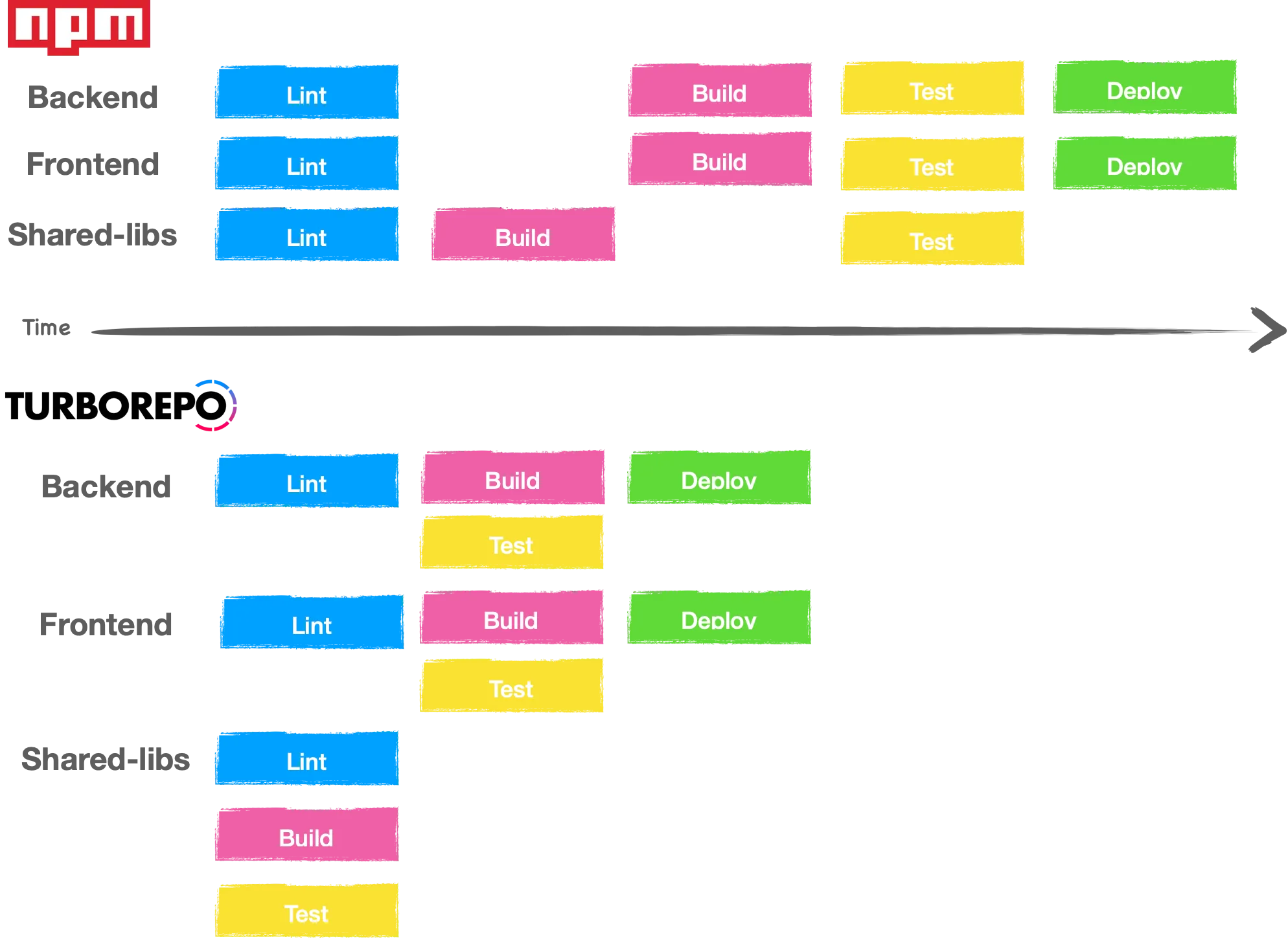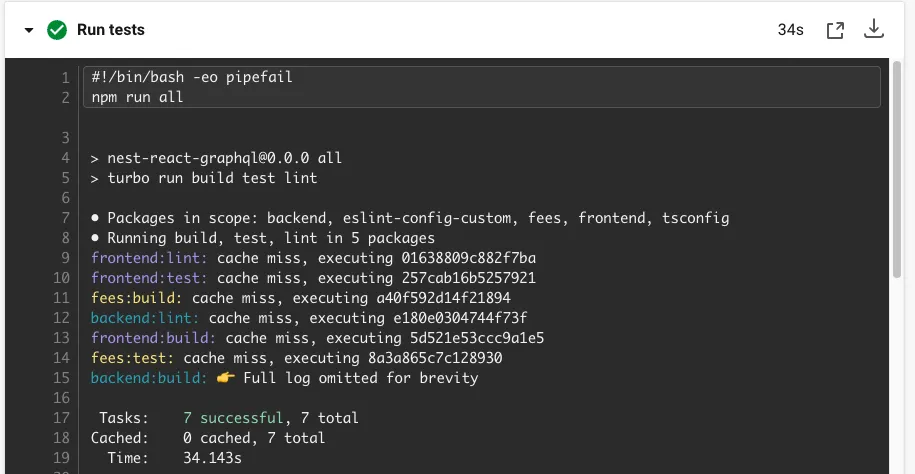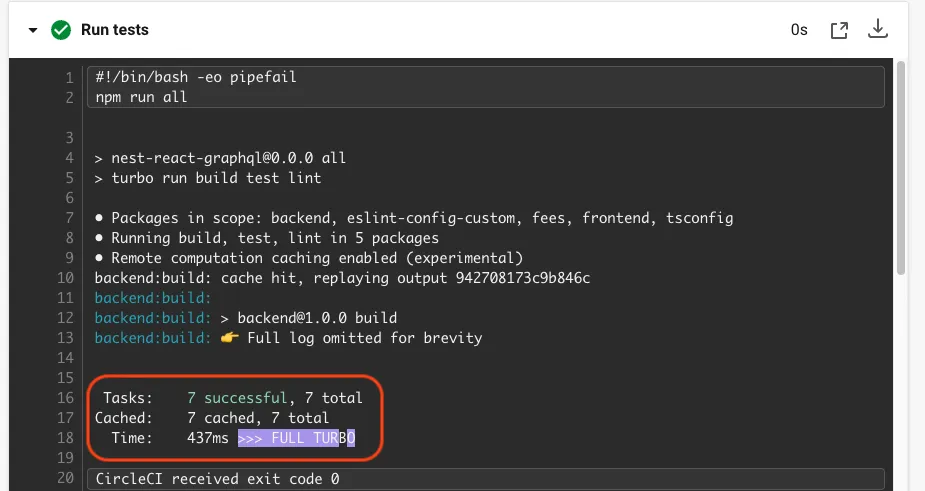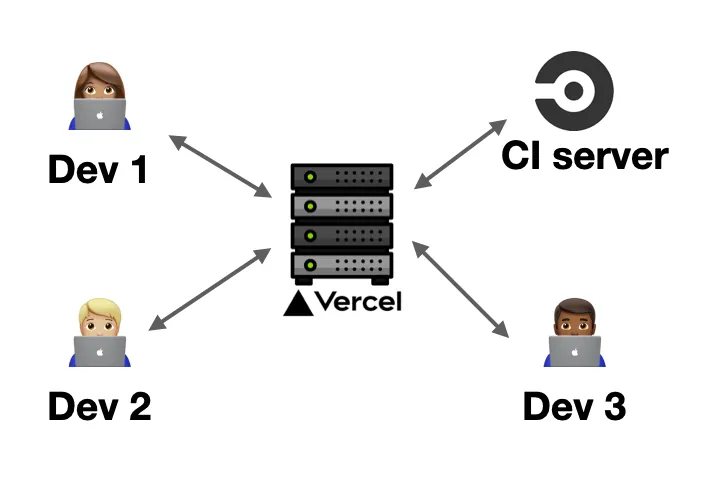
I have been working with monorepos for a couple of years now. I really like to have everything in one place. But this architectural style often comes with cons. My biggest pain point: the Continuous Integration (CI)! This is usually something quite painful, mostly when you have packages depending on each other.
Let’s say I have a monorepo with 3 packages:
- frontend: the frontend app;
- backend: the backend app;
- shared-libs: some code that can be shared between Backend and Frontend.
My CI pipeline should look like something similar:

And, inside my jobs, something like this:
# lint allnpm run lint --workspaces --if-present
# build allnpm run build --workspace=shared-libsnpm run build --workspace=frontend --workspace=backend
# test&deploy allnpm run test --workspaces --if-presentnpm run deploy --workspaces --if-presentBut now if I add a new package that depends on shared-libs, I will have to rethink my entire
pipeline. In my previous company we had between 35 and 40 packages in a single monorepo. I will let
you guess how complex it was to manage ;)
But, that was before Turborepo.
Turbo’s Pipelines to the rescue
In a nutshell, Turborepo is a tool that manages the monorepo complexity. One of his core concepts is the “pipelines”, an option in the turbo config file where you can define the relation between the packages and also the jobs.
Mine look like this:
{ "$schema": "https://turborepo.org/schema.json", "baseBranch": "origin/main", "pipeline": { "build": { "outputs": ["dist/**", "build/**"], "dependsOn": ["^build"] }, "lint": { "outputs": [] }, "test": { "dependsOn": ["^build"], "outputs": [] }, "dev": { "cache": false }, "deploy": { "dependsOn": ["build", "test", "lint"], "outputs": [] } // ... }}Then with the config, turbo will be able to optimise my entire deployment pipeline.

With only one command:
npx turbo run build test lint deployCaching
Another part where this tool shine is the cache. Turbo can detect if a task needs to be run or not
based on the previous execution. If it hits a cache, it will return the logs previously cached. In
this way, commands like npx turbo run build test lint can take less than a second.
This is very convenient when you change the colour of a button, you don’t want to run all the
lint/test/build on the backend app.
You can also configure jobs like test to only refresh the cache if a js/ts file was changed.
Sharing the cache
On my first attempt, I did manage to run the entire build steps in ~34s (it’s more or less a “hello world” project). In the real-world scenario, it’s usually longer than that.
To reduce this time, the Turborepo team added something quite smart: a shared cache. This feature allows you to share your turborepo cache with your colleagues… and your CI!
Before: without cache - 34s

After: with a shared cache - 0.437s 🤩

How does it work?
The shared cache is hosted on the Vercel servers. What you have to do is to follow the steps on the documentation. I’ve made my tests with my freemium account. But keep in mind that this is a paid feature for teams.

Let’s recap
I haven’t tried this tool in a production environment (not yet). But, my experiments went really smoothly. The ability to not execute tasks that have been done before is definitely the biggest pro. I wish I knew this tool back in the day when I was managing my previous company’s monorepo!
There are also some little extras I didn’t mention like generating a dependency graph (with Graphviz).
I have a plan to bring this tool to my company monorepo. I may add a “follow-up” section when I have more to share!
About the author

Hey, I'm Maxence Poutord, a passionate software engineer. In my day-to-day job, I'm working as a senior front-end engineer at Orderfox. When I'm not working, you can find me travelling the world or cooking.
Follow me on BlueskyRecommended posts

A Git Cheat Sheet that focuses on Essential Commands for Experienced Developers.

Thomas Harris is a fraudulent YouTuber who uses fake crypto tutorials to spread malware. He artificially inflates his channel's popularity and promotes a malicious script that downloads harmful files and steals crypto. This scam, powered by AI-generated content, highlights the growing sophistication of online threats.